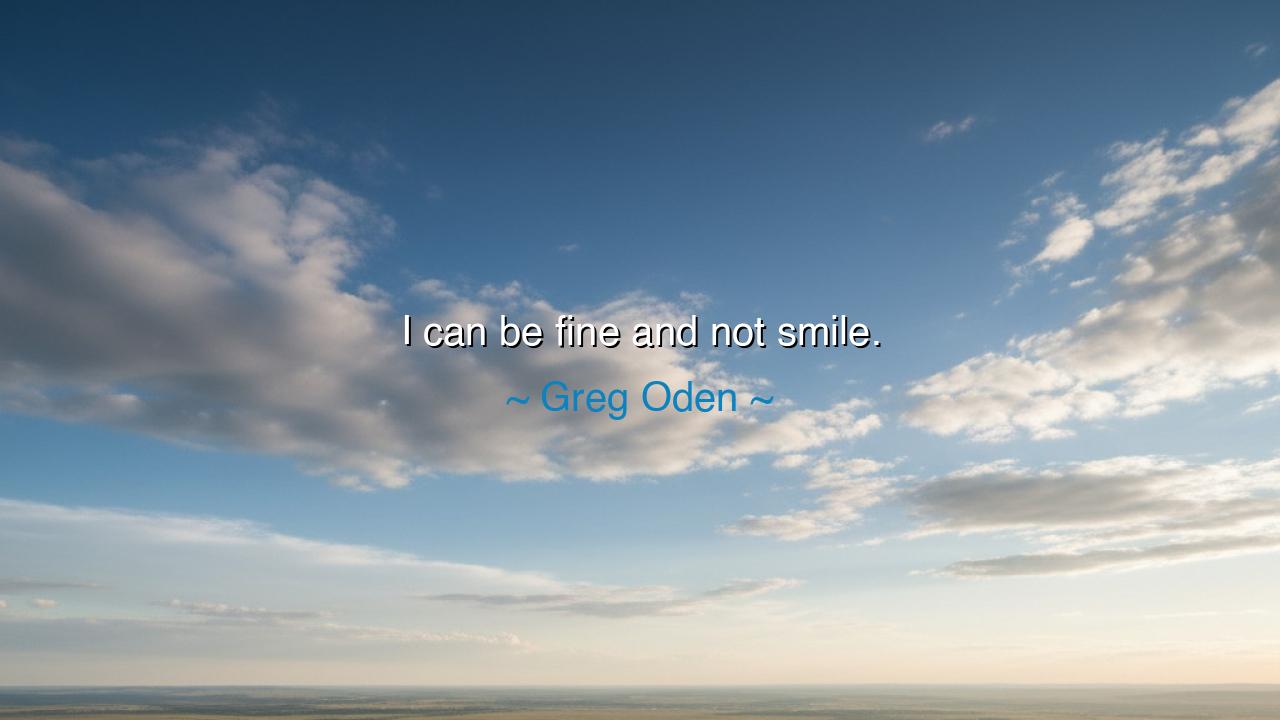
I can be fine and not smile.






Hear the words of Greg Oden, a man who bore the weight of promise and the shadow of unfulfilled destiny, yet spoke with the quiet wisdom of one who has learned the truth of the heart: “I can be fine and not smile.” Though the phrase is short, it resounds with the force of ancient teaching. It reveals that appearances are not always the measure of the soul, and that true well-being does not need to clothe itself in the mask of constant smiles. In these words lies the lesson of authenticity, a reminder that to be at peace does not always mean to shine outwardly with cheer.
The meaning of this quote is profound. Society has long demanded that joy must always show itself in smiling, as though happiness were incomplete without its public display. But Oden, who endured injuries, disappointments, and the harsh glare of expectation, came to understand that peace is an inward flame, not an outward performance. One may walk in calm, hold strength within, and still wear a solemn face. The smile is not the only language of being “fine”; silence, composure, and stillness too speak of inner stability.
History itself bears witness to this truth. Consider George Washington, who was known for his solemn demeanor. Rarely did he smile in public, and many thought him cold. Yet within him burned a steady determination that carried a nation through revolution. His lack of outward cheer did not mean he was broken; rather, his calm exterior masked the firm resolve of his spirit. Like Greg Oden, Washington teaches us that the absence of a smile does not equal the absence of strength.
There is also a deeper wisdom here: by declaring “I can be fine and not smile,” Oden dismantles the tyranny of false appearances. How many have been told, “Smile, and you will feel better”? How many are pressured to feign joy even when their soul seeks rest or silence? Oden’s words are an act of defiance against this falsehood. They proclaim the right to be whole without pretense, to carry dignity without the mask of forced cheer. This is not rejection of joy, but affirmation of authenticity.
The heroic heart understands that strength is not always radiant. There is a quiet heroism in the one who endures without display, who holds their ground with no need for the approval of smiles. Think of the stoic warriors of Sparta, who were taught not to boast, not to reveal, but to stand firm. Their greatness did not come from laughter or show, but from their inner steel. Oden’s words echo that same stoic spirit, teaching us that serenity can dwell beneath solemnity.
The lesson for us, O seekers of wisdom, is clear: do not judge another’s soul by the presence or absence of a smile. Learn to see deeper. Understand that one may be at peace and still wear a quiet face. In your own life, release yourself from the burden of false appearances. To be fine is to be whole within, not to satisfy the world’s demand for outward cheer.
Therefore, let each one practice these truths: honor your inner state, without forcing it into shapes to please others. Respect others’ silence, knowing it may be filled with peace. And above all, seek authenticity, for a true heart is worth more than a thousand false smiles. In this way, you will walk not as an actor upon the stage of life, but as a soul rooted in honesty and strength.
Thus, the teaching is eternal: The measure of being fine is not the curve of the lips, but the stillness of the spirit. The absence of a smile does not mean the absence of peace. To live by this truth is to live freely, without masks, and with the dignity of the authentic self.






AAdministratorAdministrator
Welcome, honored guests. Please leave a comment, we will respond soon